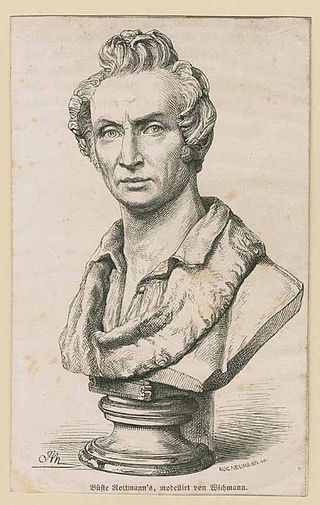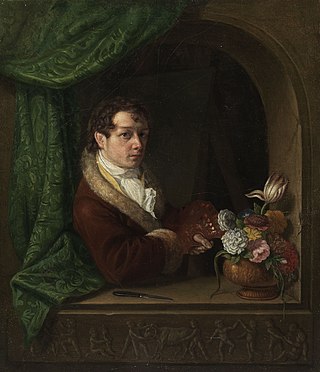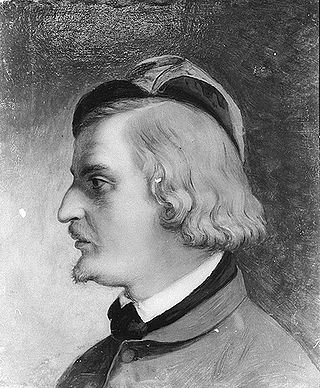
Anselm Feuerbach was a German painter. He was the leading neoclassical painter of the German 19th-century school.

Wilhelm von Kaulbach was a German painter, noted mainly as a muralist, but also as a book illustrator. His murals decorate buildings in Munich. He is associated with the Düsseldorf school of painting.

Carl Anton Joseph Rottmann was a German landscape painter and the most famous member of the Rottmann family of painters.

Leo von Klenze was a German architect and painter. He was the court architect of Ludwig I of Bavaria.
Heinrich Karl Anton Mücke was a prominent Realist painter known for his liturgical and genre paintings as well as frescoes, which still adorn some of Germany's ancient castles and cathedrals. His paintings are hung today in Germany's leading museums, including the National Gallery Berlin, Breslau Museum and the Brunn Museum. His son, Karl Mücke, was also a recognized genre painter. Heinrich Mücke was a professor at the Düsseldorf Academy and received the Portuguese Medal for Art and Sciences as well as the Breslau Medal. He is associated with the Düsseldorf school of painting.

Karl Ludwig Friedrich Becker was a German history painter and president of the Berlin Academy.

Eduard Magnus was a German painter, primarily known for portraits.

Johann August Eduard Mandel (1810-1882) was a German engraver.

Louis Asher, originally Julius Ludwig Asher, (1804–1878) was a German artist.

Johann Karl Bähr (1801–1869) was a German painter and writer.
Benjamin Calau (1724–1785) was a German portrait painter, who used an encaustic technique.

Franz Ludwig Catel was a German painter. He spent most of his career in Rome.

Heinrich Anton Dähling was a historical and genre painter born in Hanover. In 1794 he went to Berlin, where he was engaged in miniature painting and as a teacher of drawing. In 1802 he visited Paris, and the study of the galleries there first induced him to attempt painting in oil. From 1811 until his death he was a member of the Berlin Academy, and professor at the same from 1814 onwards. He died at Potsdam on 10 September 1850. One of his most famous pictures is The Descent from the Cross, the altar-piece at the Garrison Church in Potsdam. In the Berlin Gallery is a State Entry painted by him.

Ludwig des Coudres was a German history and portrait painter. He also served as a professor at the Academy of Fine Arts, Karlsruhe. His son, Adolf Des Coudres, was a well-known landscape painter.

Heinrich Dreber, known as Franz-Dreber, was a German landscape painter.

Adolf Eybel (1808–1882) was a German painter of historical and genre subjects and of portraits. He was born in Berlin. He studied at the Berlin Academy, and under Professor Kolbe, as well as in Paris under Delaroche. One of his most noted pictures represents Richard Coeur-de-Lion with his Court listening to Blondel's Song. He died in Berlin in 1882. The following works by him may also be mentioned:

Joachim Martin Falbe was a German portrait painter.

Johann (Franz) Fischbach was an Austrian painter.
Elsholtz is a German surname. Notable people with the surname include:
Arne Elsholtz was a German voice actor and dialogue director. He was one of the most well-known dubbing actors in Germany and he was also responsible for directing the German dubs of some international productions.
















